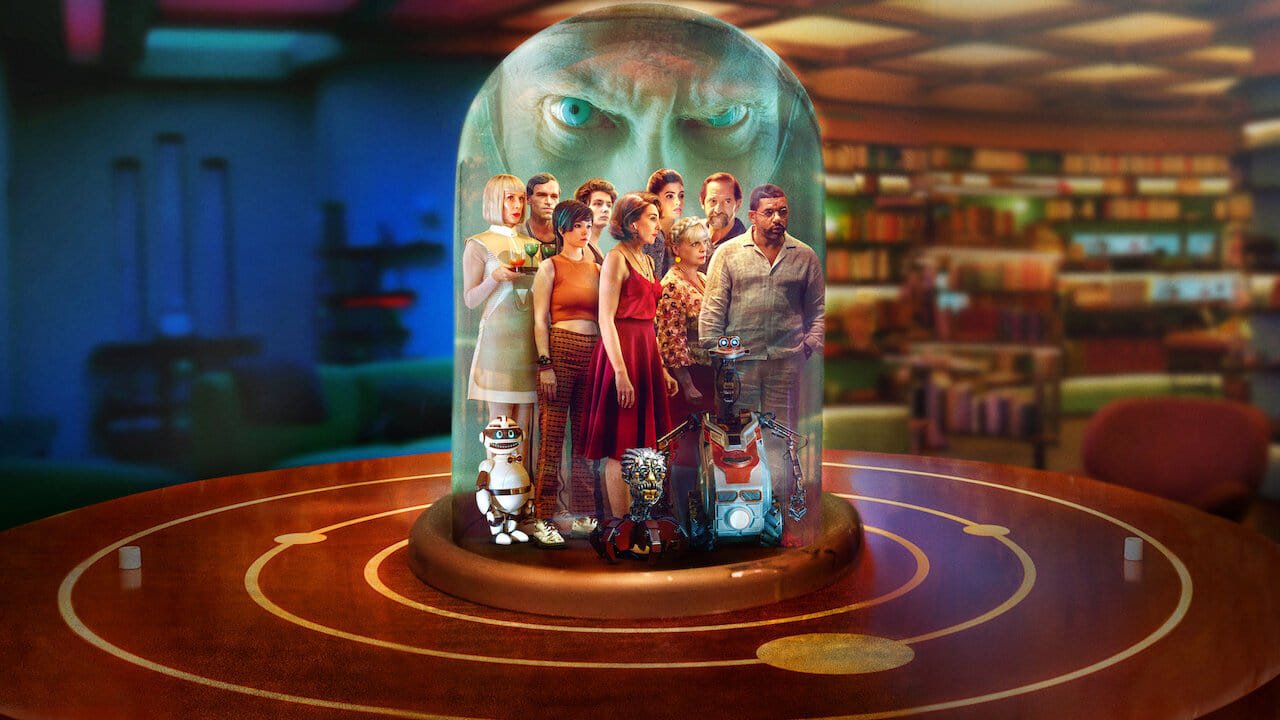Bigbug
NETFLIXWhen Yonyx Z-7389-X-AB2 (François Levental) appears during the midpoint of Jean-Pierre Jeunet’s latest film, Bigbug, the movie starts to become quite enticing and very much in line with Jeunet’s previous work – such as in Delicatessen, The City of Lost Children, and Micmacs. It’s unfortunate, however, that most of the film doesn’t take advantage of its premise, actors, and themes in a script that feels quite repetitive and, unfortunately, tedious.
The premise is quite simple: Bigbug is set in a future where androids help humans with their everyday tasks. Inside a suburban house, Alice (Elsa Zylberstein) and Max (Stéphane De Groodt) are spending quality time together, until Alice’s ex-husband Victor (Youssef Hajdi) arrives unnoticed with his fiancé (Claire Chust) to drop off their daughter (Marysol Fertard), while her neighbor (Isabelle Nanty) drops in to find her dog. As they are about to leave, the androids lock them out of their homes, because the Yonyx androids have revolted themselves against humans in the hopes of becoming the dominant “species” of planet Earth.
Android uprising films are nothing new. Heck, two months ago, Mother/Android was released on Hulu and specifically touched upon the effects of an android uprising. Jeunet treads in familiar territory here but has the opportunity to do something truly special, especially with such a rich and detailed backstory of how the Yonyx came to be. But it, unfortunately, goes nowhere with its plot, preferring to stay in superficial bouts of the same character problems over and over again. How many times does Jennifer (Chust) have to remind the audience that she was supposed to be on vacation before the Yonyx uprising started?
Or an even more redundant bit is whenever the movie cuts to a show called Homo Ridiculus, where the Yonyx constantly humiliates humans for their entertainment, supposedly drawing a social commentary on the relationship between humans and artificial intelligence. Its social commentary can be summed up with “Robots bad. Don’t trust them.”, which is the main message of every single robot uprising film ever. The films that go above surface-level comments on power-hungry humans trusting robots – such as Paul Verhoeven’s RoboCop – have something to say that makes all of us reflect on our place in the world and our relationship with technology.
Bigbug has nothing of interest to say on the Yonyx’s rationale to rid the world of “hostile” humans or the Meca androids helping Alice, aside from their quest to become human, in a not-so-subtle nod to Steven Spielberg’s A.I. Artificial Intelligence. When Claude Perron’s Monique attempts to tell a joke and then laugh it off, it immediately recalls Haley Joel Osment’s David laughing it off, but it also goes nowhere. The Mecas want to share human qualities, believing they won’t get rejected if they do so, but that bit provides no payoff or depth to any of the robot characters.
The main problem with Jeunet and Guillaume Laurant’s script is how they repeat situations ad nauseam, instead of expanding on the elements that would make the sci-fi film interesting: the relationship between humans and androids, or how technology now dictates 2045 Earth. None of these are present, as Jeunet prefers to do a huis-clos film involving characters repeating the same lines of dialogue until Levantal shows up. And the only thing that may keep the audience watching during its first hour is Thomas Hardmeier’s stunning cinematography, which is as colorful and vivid as Jeunet’s previous work and features his unique brand of camera angles that serve themselves quite well when François Levantal appears.
Because it is in that precise moment where the movie lifts itself from tedious and repetitive character drama to gripping sci-fi thriller. Levental’s character is a hybrid robot drawing a fine line between Schwarzenegger’s T-800, RoboCop, and the bizarre facial expressions usually found in a David Lynch film. Levental’s Yonyx is by no means friendly, and yet his awkward and ill-timed smiles exacerbate the tension on display and make for a more uncomfortable atmosphere. None of the actors aren’t as memorable as Levental, since the script reduces the characters to the same platitudes they keep repeating, which ensures that they will never be able to showcase their acting skills. The character actor isn’t getting enough attention for his incredible performance, but it’s the best supporting role of the year so far. His sense of timing and line delivery is impeccable and can play with many emotions at the same time for a frightening or uncomfortable effect. He’s also the only actor in the entire film that gives the Yonyx enough backstory and context for the audience to understand the characters and the menace they pose to humans, compared to the actual human characters who have very little depth and audience engagement.
Yonyx can kill anyone he wants in an instant and can escalate any given situation rather quickly, but he also has plenty of weaknesses that the suburbian characters will try to exploit in the hopes of bringing him down. This is also where the movie showcases Jeunet’s love for all things abnormal, through his camera angles and action sequences, so clumsily choreographed that it harkens back to Robert Rodriguez’s green-screen-filled kids' films, The Adventures of Sharkboy and Lavagirl in particular. It’s a stroke of genius that ends the film on a high note, even if what came before was rather mediocre.
Bigbug isn’t a perfect film, but its staggering cinematography and Oscar-worthy – oh yes – performance from François Levental elevate the film’s platitudes to a palpable enough sci-fi film. But its overlong first act, which features a slew of cyclical situations, falters the movie and, as a result, is nothing more than a palpable, yes, but ultimately disappointing and unfulfilling sci-fi film, where the main social commentary is second fiddle for a fairly dull huis-clos story. Here’s hoping that Jean-Pierre Jeunet’s next film will be better.


